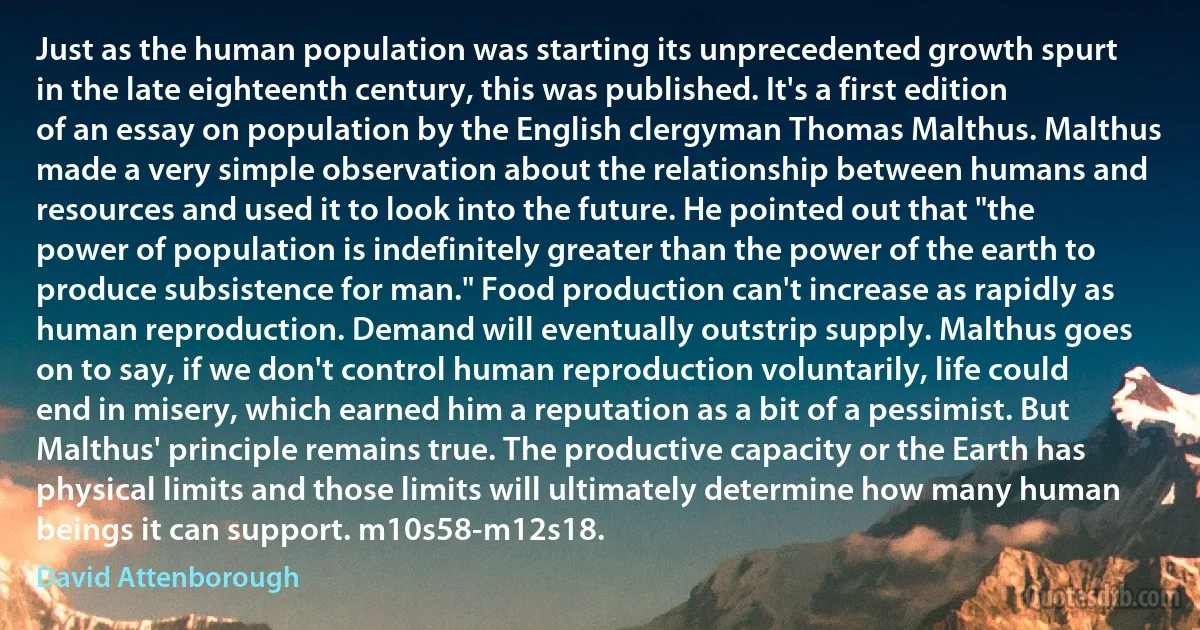
Just as the human population was starting its unprecedented growth spurt in the late eighteenth century, this was published. It's a first edition of an essay on population by the English clergyman Thomas Malthus. Malthus made a very simple observation about the relationship between humans and resources and used it to look into the future. He pointed out that "the power of population is indefinitely greater than the power of the earth to produce subsistence for man." Food production can't increase as rapidly as human reproduction. Demand will eventually outstrip supply. Malthus goes on to say, if we don't control human reproduction voluntarily, life could end in misery, which earned him a reputation as a bit of a pessimist. But Malthus' principle remains true. The productive capacity or the Earth has physical limits and those limits will ultimately determine how many human beings it can support. m10s58-m12s18.
David AttenboroughRelated topics
bit century clergyman control earth edition eighteenth end english essay food future human increase late life man misery power produce production reproduction reputation say simple spurt subsistence support remains MalthusRelated quotes
For, strange as the statement will appear at first sight, modern metaphysics, and to a large extent modern physical science, have been groping for centuries blindly after knowledge which occult philosophy has enjoyed in full measure all the while. Owing to a train of fortunate circumstances, I have come to know that this is the case; I have come into some contact with persons who are heirs of a greater knowledge concerning the mysteries of Nature and humanity than modern culture has yet evolved; and my present wish is to sketch the outlines of this knowledge, to record with exactitude the experimental proofs I have obtained that occult science invest its adepts with a control of natural forces superior to that enjoyed by physicists of the ordinary type, and the grounds there are for bestowing the most respectful consideration on the theories entertained by occult science concerning the constitution and destinies of the human soul.

Alfred Percy Sinnett
The concept of the « struggle for existence » has been applied to microbial interrelationships in nature in a manner comparable to the effects assigned by Darwin to higher forms of life. It has also been suggested that the ability of a microbe to produce an antibiotic substance enables it to survive Giom. in competition for space and for nutrients with other microbes. Such assumptions ppear to be totally unjustified on the basis of existing knowledge. Before we proceed with a discussion of the formation and activities of antibiotics under natural conditions, we must consider certain fundamental aspects of the problem of antibiotic production under controlled laboratory or factory conditions... All the discussion of a "struggle for existence" in which antibiotics are supposed to play a part, is merely a figment of the imagination, and an appeal to the melodramatic rather than the factual.

Selman Waksman
How came the king by a power which the people are afraid to trust, and always obliged to check? Such a power could not be the gift of a wise people, neither can any power, which needs checking, be from God; yet the provision, which the constitution makes, supposes such a power to exist. But the provision is unequal to the task; the means either cannot or will not accomplish the end, and the whole affair is a felo de se; for as the greater weight will always carry up the less, and as all the wheels of a machine are put in motion by one, it only remains to know which power in the constitution has the most weight, for that will govern; and though the others, or a part of them, may clog, or, as the phrase is, check the rapidity of its motion, yet so long as they cannot stop it, their endeavors will be ineffectual; the first moving power will at last have its way, and what it wants in speed is supplied by time.

Thomas Paine
I think its time to get motivated folks. I don't know what you're doing, but it's time to get really moving. We are rapidly running out of time. What do we do? Number one, you need to realize that God is in control. Don't get nervous, get busy, but don't get nervous. For he's the potter, we're the clay. Do what he says, simple. We should be as wise as serpents and harmless as doves. Be careful for nothing, full of care. Don't get nervous, just get busy. We should pray for those in authority. If you were praying for your senators, you would know their names, wouldn't you? We're God's children. It's our job to obey him. Preach the Gospel. We're suppose to be the salt of the earth. Salt does a lot of interesting things. Salt preserves; you should be a preserving force in your community. Salt irritates. If nobody is irritated with you, you aren't a good Christian.

Kent Hovind
Bukharin, like Lenin, regarded the system of basing economic life on mass terror not as a transient necessity but as a permanent principle of socialist organization. He did not shrink from justifying all means of coercion and held, like Trotsky at the same period, that the new system called essentially for the militarization of labour – i.e. the use of police and military force to compel the whole population to work in such places and conditions as the state might arbitrarily decree. Indeed, once the market is abolished there is no longer any free sale of labour or competition between workers, and police coercion is therefore the only means of allocating "human resources”. If hired labour is eliminated, only compulsory labour remains. In other words, socialism – as conceived by both Trotsky and Bukharin at this time – is a permanent, nation-wide labour camp. (pg. 28-9)

Leszek Kołakowski
